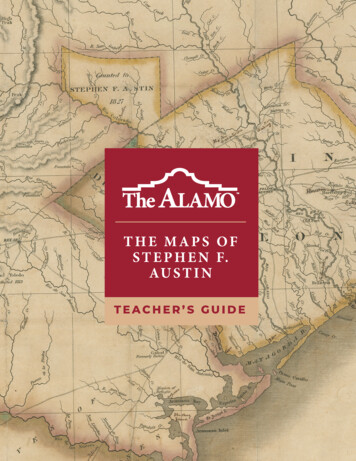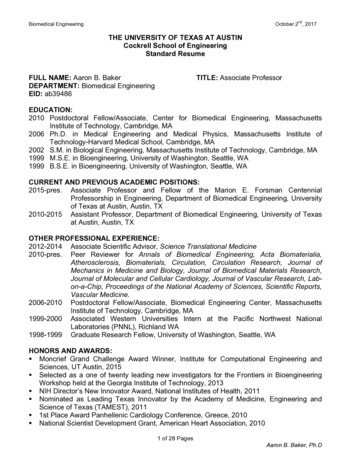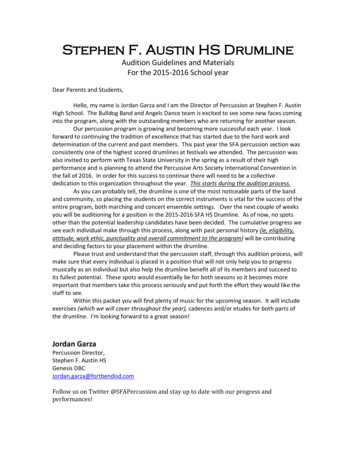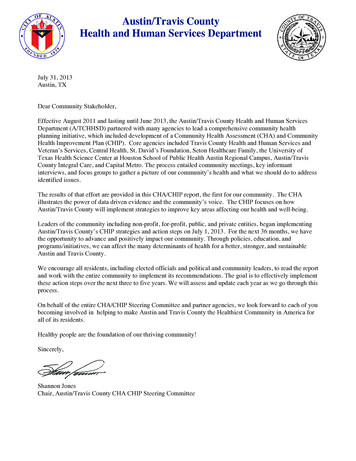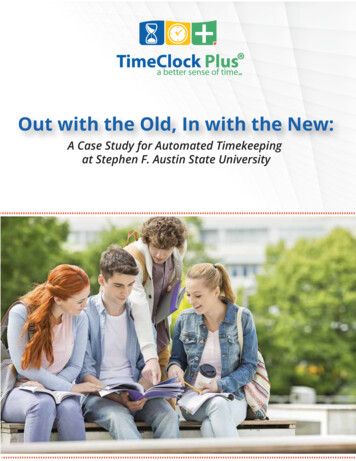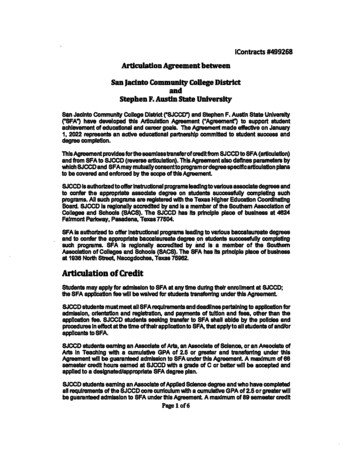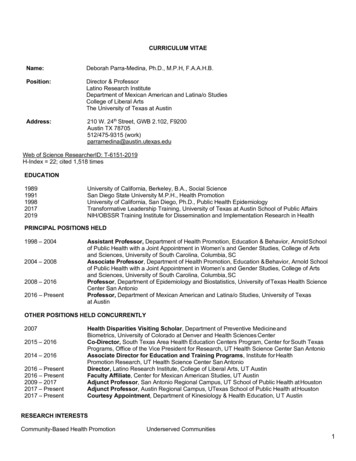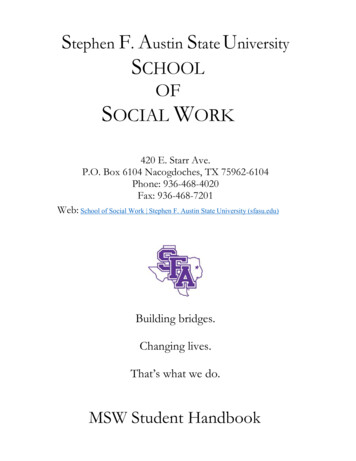
Transcription
Stephen F. Austin State UniversitySCHOOLOFSOCIAL WORK420 E. Starr Ave.P.O. Box 6104 Nacogdoches, TX 75962-6104Phone: 936-468-4020Fax: 936-468-7201Web: School of Social Work Stephen F. Austin State University (sfasu.edu)Building bridges.Changing lives.That’s what we do.MSW Student Handbook
STEPHEN F AUSTIN STATE UNIVERSITY.School of Social WorkP.O. Box 6104, SFA Station Nacogdoches, TX 75962-6104Office – (936) 468-5105 Fax (936) 468-7201 www.sfasu.edu/socialworkDear Students,Welcome to Stephen F. Austin State University. We are so excited that you have chosenStephen F. Austin State University School of Social Work to pursue your MSW. Congratulationson all of your hard work, which brought you to this time and place. You have made an excellentdecision to advance your career not only by pursuing graduate education, but by choosing to do ithere, at the Stephen F. Austin State University School of Social Work, a program that is recognizedas a leader in rural social work.You are beginning an educational journey in which you will not only build knowledge andskills in a meaningful profession, but also grow in deeply personal ways. There will be challenges,opportunities and perhaps even some fun. Among the challenges is the stretching that comes withlearning and among the opportunities are new friends and professional colleagues. You are nowpart of the SFA community!This MSW Handbook contains important information about the School, the program ofstudy and the administrative regulations governing your participation in the program. Please use itas a guide throughout your program at the School of Social Work. If you have specific questionsthat are not answered here, please contact a member of the social work faculty or staff; they arealso available to you for advising and information.We wish you well in your graduate studies and trust that you will find the knowledge andexpertise that you gain here exciting and suited to your own professional goals. We wish yousuccess!The Faculty and StaffStephen F. Austin State UniversitySchool of Social Work
Table of ContentsSchool of Social Work Faculty and Staff . 4Mission of the School of Social Work. 5Mission of the MSW Program . 5MSW Program Goals . 5Admission Criteria . 5CSWE/EPAS Core Competencies . 7CSWE/EPAS Component Behaviors/Student Learning Outcomes:Generalist Practice Curriculum. 7CSWE/EPAS Practice Behaviors/Student Learning Outcomes:Specialized Practice Curriculum. 9MSW Program Curriculum . 12Field Instruction . 14Policy: Field Instruction in a Student’s Place of Employment . 16Policy: Consideration of Criminal History Record of Social Work Students . 18Child Welfare Professional Development Project . 20Curriculum Design. 20MSW Course Descriptions . 6Student Advisement . 8Evaluation of Students’ Academic Performance . 9Student Organizations. 13National Association of Social Workers (NASW) . 14General Information. 17Non-Discrimination Policy . 17Student Code of Conduct . 20Class Attendance . 21Student Academic Dishonesty . 22Acceptable Student Behavior . 23APPENDIXES . 272018 NASW Code of Ethics – effective January 1, 2018 . 28International Federation of Social Workers (IFSW) . 29International Association of Schools of Social Work. 31MSW Supplemental Application . 33Last Revised November 2021
School of Social Work Faculty and StaffFreddie Avant, Professor, Ph.D., Professor, Associate Dean/Director of School of Social WorkKristen Bailey-Wallace, MSW, Assistant ProfessorKathleen Belanger, Ph. D., Emeritus ProfessorCarrie Butler, Ph. D., Clinical InstructorJosé Carbajal, Ph.D., Assistant ProfessorSteve Cooper, Ph.D., ProfessorWilma Córdova, MSW, ProfessorLinda Harris, Clinical Instructor, Director of Field InstructionCarol Levine, Administrative Assistant, BSW ProgramJudy Montgomery Administrative Assistant, Field Instruction ProgramJames Morris, Ph.D., Assistant ProfessorMary Newton, Administrative Assistant, MSW ProgramEmmerentie Oliphant, Ph.D., Professor/MSW Program DirectorRonald Rush, Ph.D., ProfessorShanta Scott, MSW - Clinical InstructorDiane Sizemore, Child Welfare Professional Development Project Director
Mission of the School of Social WorkThe mission of the School of Social Work at Stephen F. Austin State University is toprepare competent and effective professional social workers committed to generalist and advancedpractice able to respond to the needs of rural communities and to the challenges faced by peoplewith rural lifestyles. The School is committed to providing leadership for the region, particularlyin identifying and addressing community needs and issues, including those related to thealleviation of poverty and oppression within the context of rurality, cultural diversity and socialand economic justice. In support of its educational endeavors, the school is dedicated to excellencein teaching, research, scholarship, lifelong learning and community service.Mission of the MSW ProgramThe mission of the MSW Program at Stephen F. Austin State University (SFASU) is toprepare competent and effective professional social workers committed to advanced generalistpractice and able to respond to the needs of rural communities and to the challenges faced bypeople with rural lifestyles. The program is committed to providing leadership for the region,particularly in identifying and addressing community needs and issues, including those related tothe alleviation of poverty and oppression within the context of rurality, cultural diversity and socialand economic justice. In support of its educational endeavors, the program is dedicated toexcellence in teaching, research, scholarship, lifelong learning and community service.MSW Program GoalsThe MSW Program goals are derived from the School’s mission and are as follows:1.Prepare professional social workers who will demonstrate integration and autonomous use ofsocial work knowledge, values and skills in advanced generalist social work practice withindividuals, families, groups, organizations and communities within a rural and globalcontext.2.Prepare professional social workers who will demonstrate critical thinking and ethical socialwork practice with systems of all sizes within a rural context based upon the knowledge,values and skills that encompass a generalist perspective and advanced generalist practice.3.Prepare professional social workers who will identify with the profession, take an active rolein professional leadership within their local communities and larger systems and be lifelonglearners.4.Prepare professional social workers with research knowledge and skills to evaluate andadvance social work practice, influence rural policy, advocate for social and economic changewith attention to diversity, rural communities and people with rural lifestyles and add to theknowledge base of rural social work practice.5.Maintain reciprocal relationships with social work practitioners, groups, communities andorganizations in the region, nationally and globally.6.Strengthen rural social work through the School’s professional and community service andscholarship.Admission Criteria
In order to be considered for admission to the MSW Program, applications must submit:1) an SFA graduate school application, 2) official transcripts, 3) three letters of recommendationusing the attached form, 4) supplemental application for the MSW Program, 5) a written statementof interest in social work and 6) a professional resume. (Visit: msw-application-packet.pdf(sfasu.edu) for forms)Non-Advanced StandingTo be considered for clear, non-advanced standing admission, applications should presentan overall GPA of at least 2.5 and a GPA of 3.0 for the last 60 hours. Applicants who demonstrateoutstanding qualifications on other admission criteria may be admitted on a probationary basiswith an overall GPA of 2.5 and 2.8 GPA for the last 60 hours.Advanced StandingA limited number of students may be admitted to the advanced standing program. To beconsidered for advanced standing, applicants must have earned a Bachelor’s Degree in SocialWork from a program accredited by the Council on Social Work Education. Applicants admittedon a probationary status are not eligible for advanced standing.To receive advanced standing, an applicant must have made a minimum GPA of 3.0 in thelast 60 credits of undergraduate course work and a 2.5 GPA overall. Decisions on courseequivalency credit will be made by the MSW Program Director.Advanced placement credit may be awarded for SOCW 5301, SOCW 5302, SOCW 5307and SOCW 5312. Advanced standing credit is not automatic and students may be required tosubmit course equivalency information or successfully complete a competency examination beforereceiving credit for a course. All students who receive advanced standing must complete aminimum of 35 credit hours in order to receive the MSW. Part-time, advanced standing studentsmust complete the program in two years.AccreditationThe MSW Program is accredited by the Council on Social Work Education.
CSWE/EPAS Core CompetenciesCompetency 1: Demonstrate Ethical and Professional BehaviorCompetency 2: Engage Diversity and Difference in PracticeCompetency 3: Advance Human Rights and Social, Economic and Environmental JusticeCompetency 4: Engage In Practice-informed Research and Research-informed PracticeCompetency 5: Engage in Policy PracticeCompetency 6: Engage with Individuals, Families, Groups, Organizations and CommunitiesCompetency 7: Assess Individuals, Families, Groups, Organizations and CommunitiesCompetency 8: Intervene with Individuals, Families, Groups, Organizations and CommunitiesCompetency 9: Evaluate Practice with Individuals, Families, Groups, Organizations andCommunitiesCSWE/EPAS Component Behaviors/Student Learning Outcomes:Generalist Practice CurriculumCompetency 1: Demonstrate Ethical and Professional Behavior Make ethical decisions by applying the standards of the NASW Code of Ethics, relevantlaws and regulations, models for ethical decision-making, ethical conduct of research andadditional codes of ethics as appropriate to contextUse reflection and self-regulation to manage personal values and maintain professionalismin practice situationsDemonstrate professional demeanor in behavior; appearance; and oral, written andelectronic communicationUse technology ethically and appropriately to facilitate practice outcomesUse supervision and consultation to guide professional judgmentCompetency 2: Engage Diversity and Difference in Practice Apply and communicate understanding of the importance of diversity and difference inshaping life experiences in practice at the micro, mezzo and macro levelsPresent themselves as learners and engage clients and constituencies as experts of theirown experiencesApply self-awareness and self-regulation to manage the influence of personal biases andvalues in working with diverse clients and constituenciesCompetency 3: Advance Human Rights and Social, Economic and Environmental Justice Apply their understanding of social, economic and environmental justice to advocate forhuman rights at the individual and system levelsEngage in practices that advance social, economic and environmental justice.Competency 4: Engage in Practice-informed Research and Research-informed Practice
Use practice experiences and theory to inform scientific inquiry and researchApply critical thinking to engage in analysis of quantitative and qualitative researchmethods and research findingsUse and translate research evidence to inform and improve practice, policy and servicedeliveryCompetency 5: Engage in Policy Practice Identify social policy at the local, state and federal level that impacts well-being, servicedelivery and access to social servicesAssess how social welfare and economic policies impact the delivery of and access tosocial servicesApply critical thinking to analyze, formulate and advocate for policies that advance humanrights and social, economic and environmental justice.Competency 6: Engage with Individuals, Families, Groups, Organizations andCommunities Apply knowledge of human behavior and the social environment, person-in-environmentand other multidisciplinary theoretical frameworks to engage with clients andconstituenciesUse empathy, reflection and interpersonal skills to effectively engage diverse clients andconstituenciesCompetency 7: Assess Individuals, Families, Groups, Organizations and Communities Collect and organize data and apply critical thinking to interpret information from clientsand constituenciesApply knowledge of human behavior and the social environment, person-in-environmentand other multidisciplinary theoretical frameworks in the analysis of assessment data fromclients and constituenciesDevelop mutually agreed-on intervention goals and objectives based on the criticalassessment of strengths, needs and challenges within clients and constituenciesSelect appropriate intervention strategies based on the assessment, research knowledge andvalues and preferences of clients and constituenciesCompetency 8: Intervene with Individuals, Families, Groups, Organizations andCommunities Critically choose and implement interventions to achieve practice goals and enhancecapacities of clients and constituenciesApply knowledge of human behavior and the social environment, person-in-environmentand other multidisciplinary theoretical frameworks in interventions with clients andconstituenciesUse inter-professional collaboration as appropriate to achieve beneficial practice outcomesNegotiate, mediate and advocate with and on behalf of diverse clients and constituenciesFacilitate effective transitions and endings that advance mutually agreed-on goalsCompetency 9: Evaluate Practice with Individuals, Families, Groups, Organizations andCommunities
Select and use appropriate methods for evaluation of outcomesApply knowledge of human behavior and the social environment, person-in-environmentand other multidisciplinary theoretical frameworks in the evaluation of outcomesCritically analyze, monitor and evaluate intervention and program processes and outcomesApply evaluation findings to improve practice effectiveness at the micro, mezzo and macrolevelsCSWE/EPAS Practice Behaviors/Student Learning Outcomes:Specialized Practice CurriculumSpecialized Practice: Advanced Generalist PracticeThe specialized practice focuses on advanced generalist practice with individuals, families,groups, communities and organizations influenced by rural lifestyles. It builds on the competenciesand Generalist Practice component behaviors of generalist practice. Students are prepared tobecome leaders in social work practice. They recognize and understand their role as advancedgeneralist practitioners, through self-regulation and reflection and develop leadership skills tosupervise and monitor practice. They understand the specific frameworks and theories for ruralpractice. Students develop knowledge, values and skills to demonstrate ethical and professionalbehavior, engage in diversity and difference in practice, advance human rights and social,economic and environmental justice, use research to inform practice, engage in policy practice andengage assessment, intervene and evaluate systems of all sizes influenced in rural lifestyles.Advanced generalist practitioners have differential and complex skills to practice autonomously.The following competencies and component behaviors describe the values, knowledge,skills and cognitive and affective processes that comprise the competency at the specializedpractice level.Competency 1: Demonstrate Ethical and Professional BehaviorAdvanced generalist practice social workers understand leadership roles and how the valuebase of the profession, ethical standards, relevant laws and regulations influence practice specificto rural lifestyles. They understand how their personal experiences and affective reactions impacttheir roles specific to supervision, leadership and practice. Advanced generalist practitionersmanage inter-professional teams, apply ethical principles and show leadership in the developmentof ethical standards. Advanced generalist practice social workers engage in life-long learning andare committed to continually updating their skills and supervise skills development. Theyrecognize emerging forms of technology and supervise and manage the ethical use of technologyin social work practice as it relates to systems influenced by rural lifestyles. Apply ethical decision-making and critical thinking to analyze and implement multiplecodes of ethics with the purpose to enhance advanced generalist practice with rural peopleand communities.Recognize and manage personal and professional values in order to engage in advancedrural practice with multiple systems.Competency 2: Engage Diversity and Difference in PracticeAdvanced generalist social workers are knowledgeable about various social constructionsrelated to diversity and difference in working with systems influenced by rural lifestyles. They are
knowledgeable about the intersectionality of multiple factors and how it impacts rural quality oflife. They are knowledgeable about the development of self-awareness specific to their own lifeexperiences and are able to supervise how it impacts self-reflection strategies. They apply culturalsensitive practice theories and methods to persons of diverse cultures including those of differingsexual orientation, age, religion, political ideology, gender identity and expression, immigrationstatus, sex and class; persons from both urban and rural areas; and especially those who arevulnerable to poverty, oppression, or social differences in rural communities. Advanced generalistsocial workers effectively manage diverse teams within an interdisciplinary context. Identify, analyze and apply social constructions of rurality within and across diverse groups(e.g. gender, ethnicity/race, age, socioeconomic status, sexual orientation) and acrossmultiple system levels.Supervise the integration of awareness, self-regulation, sensitivity and professionalresponse to issues of values, ethics, diversity, social justice and populations at risk.Competency 3: Advance Human Rights and Social, Economic and Environmental JusticeAdvanced generalist practice social workers show leadership in the development ofstrategies to address oppression and discrimination. They recognize the disparities and challengesspecific to access of services that people and communities with rural lifestyles face. Leadershipskills are used to develop and implement advocacy strategies for and on behalf of clients andconstituencies. Advanced generalist social workers understand fundamental human rightsincluding freedom, safety, privacy, respect, dignity and access to resources. They integrate thetheoretical frameworks, policies, international perspectives and legislation to implement anddevelop strategies to address human rights issues. Advanced generalist social workers incorporatesocial justice principles and practices to promote human and civil rights at multiple levels to ensurebasic human rights are available equitably. Apply leadership skills to promote social, economic and environmental justice to systemsof all sizes within and outside of rural communities.Provide leadership in specialized practices related to oppression and human rightsviolations at multiple levels advancing social, economic and environmental justice in ruralenvironments.Competency 4: Engage in Practice-informed Research and Research-informed PracticeAt the specialized practice level, advanced generalist social workers applies the knowledge,values and skills of advanced research methodology to enhance, evaluate and shape practice. Theysupervise, design, develop, implement and evaluate multi-disciplinary projects. They understandthe principles of logic, scientific inquiry, culturally informed and ethical approaches in advancedresearch. Advanced generalist social workers takes the lead in translating research findings toaddress grand challenges as it relates to people, communities and agencies impacted by rurallifestyles. Identify, evaluate and implement multi-disciplinary research and practice strategies withrural systems and social networks.Demonstrate leadership skills to design, develop and implement research and technologicaladvances to enhance social work practice in a rural context.Competency 5: Engage in Policy Practice
At the specialized practice level, advanced generalist social workers understand howhuman rights, social justice and social welfare and services are mediated by policy and itsimplementation at federal, state and local levels. Advanced generalist social workers are able tolead strategies of policy analysis, formulation, development, implementation and evaluationspecific to micro, mezzo and macro level systems impacted by rural life styles.They recognize how historical, social, cultural, economic, organization, environmental andglobal influences impact policies related to communities with rural lifestyles. Advanced generalistsocial workers understand how social welfare and economic policies improve quality of life andwell-being of people with rural lifestyles. Develop, prepare, implement, analyze and evaluate social welfare and economic policiesto improve the well-being of rural populations and communities. Apply leadership skills specific to advocacy with the purpose to advance human rights andsocial, economic and environmental justice to deliver services to multiple systems in ruralareas.Competency 6: Engage with Individuals, Families, Groups, Organizations andCommunitiesAdvanced generalist practice social workers use leadership skills to engage with systemsof all sized impacted by rural life styles. They understand the complex problems and issueschallenging sustainable engagement strategies with rural people and communities. Advancedgeneralist social workers supervise the process of engagement, apply theories of human behaviorto the phase of engagement and develop appropriate strategies of engagement with micro, mezzoand macro level systems impacted by rural lifestyles. Their leadership skills enable advancedgeneralist practice social workers to facilitate engagement strategies with individuals, families,groups, communities and organizations. Apply leadership skills to engage multiple systems (individuals, families, groups,communities and organizations) and constituencies in rural environments.Supervise the integration of knowledge, skills and values specific to human behavior andthe social environment, person-in-environment and appropriate theoretical frameworks.Competency 7: Assess Individuals, Families, Groups, Organizations and CommunitiesAdvanced generalist practitioners in rural social work practice understand the etiology, thenature and causes and complexity of challenges, problems and issues facing people andcommunities with rural lifestyles. They understand the importance of assessment in the problemsolving process and are able to supervise assessment processes and strategies.Advanced generalist practice social workers supervise the use of multidisciplinary andmultidimensional assessment methods. They use their knowledge of diversity, assessmentmethods, theories, approaches, policy and practice to select, develop, implement and evaluateappropriate assessment instrument and strategies. Select, implement and evaluate appropriate assessment instruments to assess diverse clientsystems on multiple levels in a rural context.Adapt, modify, develop and implement differential assessment strategies, tools andapproaches with diverse client systems and constituencies on multiple levels in a ruralcontext.
Competency 8: Intervene with Individuals, Families, Groups, Organizations andCommunitiesAdvanced generalist practice social workers understand that interventions are an ongoingcomponent of the dynamic and interactive process of specialized social work practice. They areable to apply knowledge about advanced level interventions informed by evidence. They applyand critically analyze how theories of human behavior and the social environment are translatedinto rural communities. Advanced generalist practice social workers supervise the identification,analysis, implementation and evaluation of advanced interventions strategies. They use leadershipskills to design, implement and monitor advanced intervention strategies to improve human servicenetworks and agencies in rural areas. Design, identify, analyze and implement advanced intervention strategies based onappropriate theories, models and research across multiple system levels in a rural context.Demonstrate the ability to manage, supervise, monitor, coordinate and improve humanservice networks and service agencies in delivering services to rural clients.Apply leadership skills to supervise the design and implementation of advancedintervention strategies.Apply leadership skills to enhance interventions through interdisciplinary, interprofessional and inter-organizational strategies.Competency 9: Evaluate Practice with Individuals, Families, Groups, Organizations andCommunitiesAdvanced generalist social workers understand the importance of evaluation as an ongoingcomponent of the dynamics and interaction processes of sustainable social work practice. Theirleadership skills are used to supervise evaluation strategies. Advanced generalist practitionersknow how to implement different mixed method and interdisciplinary evaluation strategies toenhance practice with people and communities influenced by rural lifestyles. Advanced generalistsocial workers are knowledgeable about the methods of dissemination and how it informsevidence-based practice. Identify, develop, apply and monitor differential evaluation strategies in advanced socialwork interventions with systems of all sizes in rural communities.Develop leadership in the communication and dissemination of evaluation results toadvance practice, policy and service delivery effectiveness.MSW Program CurriculumOverviewThe Master of Social Work degree (MSW) offered by Stephen F. Austin State Universityis a 64-credit hour program designed to be completed in two years of full-time academic study. Apart-time program of study is also offered, but all degree requirements must be completed withinfour calendar years from the date of enrollment. The program does not require an undergraduatedegree in social work for admission, but does require that students who are deficient in the liberalarts perspective complete additional course work in order to prepare them for the social workprofessional Generalist Practice courses. Undergraduate content in human biology, multiculturalstudies and social statistics are specifically required before students are allowed to enroll in
graduate courses that require knowledge of that content. All prerequisite course work must becompleted prior to or during the first semester of enrollment in the program.The MSW Program has an advanced standing program of 35 credit hours that is completedin 10 months of full-time study (one summer session and two semesters). Advanced standingstudents who are part-time must complete the program requirements within two years ofenrollment. Advanced standing is only awarded to students who have earned the bachelor’s degreein social work from a CSWE accredited program and who achieve clear admission status (2.5 GPAoverall and 3.0 GPA in the last 60 hours).Note: No program credit is given for course work or field instruction forstudents’ prior life, volunteer, or work experiences.Focus of CurriculumThe MSW Program curriculum consists of Generalist Practice and specialized practicecontent. The f
here, at the Stephen F. Austin State University School of Social Work, a program that is recognized as a leader in rural social work. You are beginning an educational journey in which you will not only build knowledge and skills in a meaningful profession, but also grow in deeply personal ways. There will be challenges,
